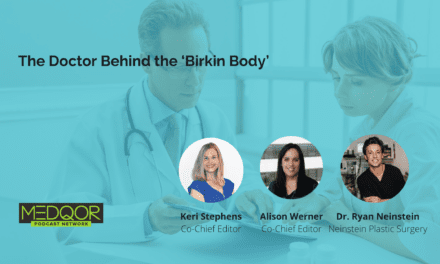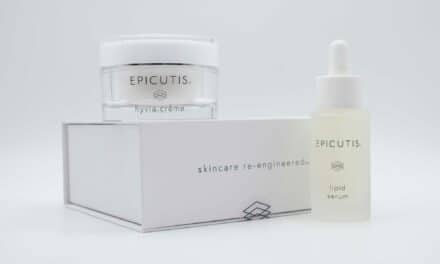In this episode of the Plastic Surgery Practice Podcast, host Keri Stephens talks with Elisabeth Potter, MD, a board-certified plastic surgeon in Austin, Texas, who specializes in DIEP flap breast reconstruction and cosmetic DIEP flap breast augmentation.
The podcast begins with Stephens expressing her personal connection to the topic, having undergone a preventative double mastectomy in 2020 and her desire to explore the importance of insurance coverage for the DIEP flap procedure. Potter, a passionate advocate for patient choice and access, shares her expertise and insights on this issue.
Patient choice is at the heart of breast reconstruction, Potter emphasizes. She highlights that many women, whether facing breast cancer or opting for preventative measures, seek alternatives to breast implants due to concerns like implant illness and future cancer. The discussion delves into the historical context of breast implant use and challenges the misconception that implants are the only solution.
The crux of the podcast revolves around changes in medical coding by the Centers for Medicare & Medicaid Services (CMS), which posed a threat to women’s access to the DIEP flap procedure. Potter highlights that insurance coverage should not merely guarantee reconstruction but should also ensure access to different surgical options in local communities, transcending the limitations of implants.
Furthermore, Potter addresses the deep-rooted gender biases in plastic surgery, highlighting the need for the industry to evolve toward more respectful and empowering conversations about women’s bodies and choices. She reflects on her personal experiences as a female plastic surgeon and the challenges she’s faced.
Finally, the conversation shifts to solutions, with Potter outlining essential steps to ensure equitable access to surgeries like DIEP flap:
- An update to the 1998 Women’s Health and Cancer Rights Act, protecting access to all types of reconstruction, including muscle-saving options.
- Revision of medical coding (CPT 19364) to accurately reflect the value of DIEP flaps.
- Fair reimbursement practices by private payers to prevent overcharging or underpaying for these procedures. PSP

Podcast Transcript
Keri Stephens 0:10
Hi, welcome to the plastic surgery practice Podcast. I’m Keri Stephens, your host today and I’m here with Dr. Elisabeth Potter, a Board Certified Plastic Surgeon in Austin, Texas who specializes in breast reconstruction. And I really wanted to talk to Dr. Potter because she’s been very vocal about advocating for insurance coverage of the DIEP flat procedure, where skin fat and blood vessels are harvested from a woman’s abdomen to create new breast and breast reconstruction. So, Dr. Potter, thank you for joining me today.
Dr Elisabeth Potter 0:39
I am thrilled to be here. Thank you so much.
Keri Stephens 0:41
Yeah, I’m thrilled to so just to start, I found you because I had preventative double mastectomy in 2020. And I have been part of the breasties community and was really taken aback when I found out that, you know, women’s access to DIEP procedure to breast reconstruction was being threatened, because I’ve talked about in the podcast before, but I really want my implants out in the next few years and would love to have a DIEP procedure. And, you know, I know for a lot of women that have had breast reconstruction, whether it’s preventative or you know, from breast cancer, that’s, that’s a procedure they want. Because if they’re afraid to have implants, they you know, implant illness is all over the news. And, you know, they still want to have breasts. So can we can you just start to talk about exactly what happened with this CMS coding for DIEP procedures?
Dr Elisabeth Potter 1:36
Absolutely. And, you know, I think, as someone who’s been doing breast reconstruction as the cornerstone of my professional life for over a decade, the issues that you bring up issues of wanting an implant and not wanting an implant, really wanting to have choice, those things have been at the center of my practice for years. So I’ve always been really tuned in to what patients around the country in different areas are, are presented with as options and what they’re nudged towards, and what’s what’s really available, which truly available in a community. Right. So, you know, the women’s health and cancer Rights Act guarantees that an insurance company has to cover your reconstruction if they cover your mastectomy, but it doesn’t really guarantee access and access is practically when you go to the doctor in your community, can you find someone who’s willing to perform natural tissue DIEP flap breast reconstruction for you in your community? Or is it just implants? Same thing for aesthetic flat closure? Real access is what are you faced with when you go to see your doctors and your team and your community? So and that’s something that I’ve been thinking about since I finished fellowship at MD Anderson, right? I chose not to stay in academics, I chose to go into private practice because I saw a need for high level microsurgery breast reconstruction, in communities outside of big academic centers where it really has always existed. So I, you know, I was following on carefully when I got a newsletter from something called the Coding Corner. It sounds like, you know, like middle school newsletter, and in this Coding Corner for plastic surgeons, it was a little blurb. And the blurb couple of years ago just said, sort of announced quietly that the code that we use, when we submit to an insurance company and ask, Can I do this surgery for Mrs. Jones? They say what surgery and we say S2F68. And that’s, that translates into that I want to do a DIEP flap. Well, they changed. And they said we’re not going to honor that code anymore. We’re going to only honor the old code that describes everything, every possible type of breast reconstruction using our own tissue. And and the problem is that that code really was invented when we were doing barbaric procedures that remove a patient’s muscle. So, you know, reading the tea leaves, when I saw that little blurb, I started to get nervous. Because if I can’t demonstrate to an insurance company, that I’m doing a better surgery that I’m doing the right surgery for my patient, I knew that they were just going to they wanted to pay one rate, they wanted to pay the lesser rate for all breast reconstruction and so that was the first time I heard of it. Since then, I’ve gotten an education in coding and I I know that this has been going on for more than a decade sort of laying the groundwork for this change to come. But it was it was alarming. And yeah, I reached out right away to folks at my society and asked for help.
Keri Stephens 4:53
Well, I have to say thank you as a mastectomy patient. I I know there’s been a really large community of women that are behind this. And I’m just really, because I know as a patient, I mean, I’m, you know, you’re coming from the doctor perspective, I’m coming from the patient perspective, it’s like, maybe you don’t want implants. I mean, let’s talk about that, like a lot of women don’t you know, and I think I think that there’s definitely, I hate to say maybe misogyny there. I don’t know, what would you say?
Dr Elisabeth Potter 5:22
Listen, I think that as a female microsurgeon, that for most of my career, I have been dealing with misogyny, the male gaze, in plastic surgery is very real, and implants have been at the center of that. And while that may not be a popular view, among the majority of plastic surgeons, I feel that intensely as a female with my own experiences, you know, wanting to feel good about my body, and trying to find people to talk to me about that. Yeah, I think that, you know, we have a problem in plastic surgery, and we’re trying to evolve. And there, there’s a huge component of female plastic surgeons now that are pushing that in a healthy and more empowered direction. But even as soon as, or, as recently is, like, 12 years ago, when I was in conferences, and they would describe plastic surgery outcomes, the terminology and the tone of describing women’s bodies in a medical setting was offensive. That was that the top plastic surgery program in the country. So we have a long way to go in a short amount of time. It’s not hard to be better than that, though. You can make really clear direct steps forward just towards respect and empowerment, and not tolerating conversations that are belittling of women, and that seek to put us in boxes.
Keri Stephens 6:53
Well, I want to get to more the DIEP, why is access to DIEP so important in a reconstruction field?
Dr Elisabeth Potter 6:59
Well, I think that there’s a couple of reasons. One is simply choice, it’s so important for patients to have choice, it’s important that at a time when patients are facing surgery to prevent or treat breast cancer, and so much power is sort of being taken away, that there’s power given back when you get to choose what your body is going to be like in the future. Right. And I think it’s really important that that’s not up for debate, these surgeries are not cosmetic surgeries, we settled that and put that to bed in 1998. That is done and dusted. Okay. So if anyone wants to visit that I would just refer you to the women’s health and cancer Rights Act, and then meet me when you’ve absorbed with that material.
Keri Stephens 7:37
No, I appreciate you doing that again. I mean, you know, I’ve even felt people have said, Oh, you know, when I had a masectomy, oh my gosh, a free boob job. It was like this. It was, you know, and there’s nothing that makes me madder but I definitely heard that, you know, or you’re so lucky. Like, because I’m, you know, I nursed my kids. Oh, you gotta get new pair. And it’s like, it’s just so not true. I mean, going through mastectomy for a woman is, it was awful. And I feel like the fact that, you know, they were trying, CMS was trying basically to take these, you know, the the choice away from women when you know, I know a lot of women don’t want implants. And I think we I think that needs to be more of a conversation because it’s just, well, let’s just give them breast implants. Oh, you’re gonna new breasts.
Dr Elisabeth Potter 8:26
I mean, listen, breasts. Yeah, breast implants are not normal. They’re not normal. But even when you think about just, you know, since the 1970s, right, this is a short period of time that we have been placing implants and to women to achieve a certain body type. And that’s, you know, cosmetically as well as reconstruction. This is not normal. And I think when you think about your lifetime, we we sort of are fooled, were deceived into thinking that this is something we’ve been doing forever. We have not, I’m not saying that it’s not safe to do in a reasonable way. But but let’s just let’s move past thinking that the majority of time breast implants have been an option for women they have not, this is an artifice, and we need to recognize that breast implants have medical issues, right? There’s breast implant illness, there’s breast implant associated cancers, so important for women who are in patients who are facing the decision for mastectomy, we’re thinking about reconstruction. I mean, for God’s sakes, I mean, think about the risk that you’re willing to assume as part of your reconstruction. So many patients would say, I will not accept any additional risk of a cancer in my reconstruction, and that, to me, is simply enough reason to have an option other than implants period.
Keri Stephens 9:49
Well, I mean, it makes sense especially, you know, for for those that are that have had the chosen have a mastectomy to prevent illness. I mean, then to say, well, you know, but this this could cause you could also get. It’s like, it’s just wild. And I know, but people don’t I don’t think every plastic surgeon is telling their patient that.
Dr Elisabeth Potter 10:07
Oh, they’re not.
Keri Stephens 10:08
I can say, from my patient perspective, I did not hear it once. And it’s taken me being in this job and be doing these podcasts to really realize how uninformed I was when I did what I went through my journey. So I think it’s amazing that you’re talking about this.
Dr Elisabeth Potter 10:23
It’s, it’s not that you were uninformed, honestly, I think that for a lot of the reality is that a lot of that information was is withheld and was withheld from patients. And I’ll tell you that when the recall initially happened, for breast implants and breast implant associated lymphoma, I spoke out publicly and said, that I felt that my patients who were having risk reducing mastectomies or mastectomies to room to remove a breast cancer should be offered the option or should be counseled about the risk of breast implant associated lymphoma if they had textured implants. And I said, I went further, I said, I think that we should be removing those implants, if patients haven’t considered that risk, want them removed. And I got, I’ll say, harassed by leadership in the American Society of Plastic Surgeons, and this was in 2019, for saying that, right, so then I’m a I’m an MD Anderson, top program, micro fellowship, I did that UT Southwestern top program in the country for plastics, I’m you know a Princeton grad, like, I’m a smart lady. And I was getting harassed for defending my patients. No, not not by everybody, but by leaders.
Keri Stephens 11:34
You heard that you heard the pushback.
Dr Elisabeth Potter 11:36
I heard it and, and it just adds fuel to the fire. So for me, as someone who does breast reconstruction, we need choice. Women need to be able to choose to have reconstruction using their own tissue, they want surgeries that last a lifetime, that involve a foreign body. And then there’s also really there’s the clinical issue, right. So when someone needs to have radiation as part of their treatment, implants and radiation do not mix well. Regardless of the fact that there are lots and lots of women out there with irradiated implants. That’s not a great idea. And when I was in training at MD Anderson, we would not offer that unless we had absolutely no other options. And that is still the case. irradiated implants have an extremely high complication rate, and extremely high failure rate, and never counsel a patient that’s a good idea. If we have another option. So simply for the vast number of women who need to have radiation as part of their treatment, we need a clinically superior outcome with natural tissue reconstruction. So it’s not just choice, it’s also health.
Keri Stephens 12:40
Can you I want to get back into just the new CMS or you know, the reversible decision. Can you talk about that a little more, because I think that’s amazing.
Dr Elisabeth Potter 12:49
And it is amazing. And I’ll tell you, so CMS really was the agency that stepped up and took action here to reverse course. And I want to make it pretty clear here that CMS wasn’t the organization that initially set us on this path.
Keri Stephens 13:03
Right.
Dr Elisabeth Potter 13:03
Initially, CMS approved us codes they they created, they created them in response to a request and maintain to them. And it wasn’t until the American Medical Association, and like our societies, the American Society of Plastic Surgeons, and, and others, you know, had dealt with this other set of codes, which are called CPT codes. And they were trying to be do their due diligence with their codes and simplify them. And there was some discussion over the last decade of whether breast reconstruction should all be fit under under one code. And the AMA and ASPS really came down on the side of saying it’s really all the same. We really just need that one code. So that’s where this came from. This didn’t come from CMS. Once, once the AMA approved a new definition of the CPT code that really clearly stated DIEP flaps are the same thing as TRAM flaps. So removing muscle and saving muscle are the same once they said that, CMS then said, Okay, well, if that’s what you guys have said, then BlueCross BlueShield, which has asked us to remove the S codes. Because there’s this other code that the AMA and the American Society of Plastic Surgeons says as the one we should use, we’ll sunset it, we’ll let it go away. They didn’t, they didn’t actively seek that out. But they said okay, in response to what you guys have done, if that’s what you think societies, if that’s what you think AMA, then then we will go along with what you’re saying we’ll remove this code, and that’s where the problems really set in. But thankfully, CMS was willing to consider how they were how removing those codes was going to remove access for patients around the country and how they also had the power to reinstate the code. So even though AMA and our society still have the other code, and that code still is confusing, CMS said, we recognize after hearing from patients and doctors, we recognize that deleting this code has caused a crisis in access. And that is not our intention. And since this thing is in our power, at CMS, we will do this thing to help patients. We still more to get more to do because that confusing code still exists out there. But um, I was, I can’t tell you what it’s like to see that kind of a decision evolve over a year.
Keri Stephens 15:35
I mean, that’s, it’s amazing. But I really as a last question, when I say do you think there are further steps that need to be taken to make sure there’s equitable access to DIEP flap and other specialized surgeries that don’t include implants?
Dr Elisabeth Potter 15:48
Absolutely. So I think I can spell them out really clearly, we need, we need an update to the women’s health and cancer Rights Act. So that act, which I would prefer, we call the patient’s health and cancer Rights Act, we need to protect specifically access to all types of reconstruction that includes these muscle saving reconstructions. And we need to protect access to aesthetic flat closures as well. So those are two glaring absences. And that act, we also need to ensure that patients are required to be counseled adequately regarding their options. So have some requirement for Informed Consent documented in the medical chart, before someone has breast reconstruction. And I would say honestly, that we should really refer to that as chest wall reconstruction because a lot of patients don’t want their breasts reconstructed, but they want to look as pretty as possible or smooth as possible. So that’s number one, update that number two is that we really do need for that that CPT 19364 that had an editorial change, to add DIEP flaps and equate those with TRAM flaps and old time flaps, we need that code to get revised. We need for them to undo that. And that’s not CMS. That’s the American Medical Association. They need to recognize that this hurts women and do the right thing. And then we need for private payers for the insurance companies to to act honorably and reimburse appropriately across the country equitably and appropriately for this reconstruction. There’s no one is blameless here, there are doctors out there charging $100 – $200,000 for DIEP flap surgery, and that’s highway robbery. At the same time, there are insurance companies that only want to pay me $2,000 to do that surgery. And that’s highway robbery. So we have to be reasonable adults recognize that the doctors and the insurance companies are not the most important part of this equation. The patients are. Let’s come up with a reasonable reimbursement for this surgery and set that as a new benchmark so that nobody is getting taken advantage of especially patients.
Keri Stephens 17:51
I think you summed it up perfectly. Well thank you so much, Dr. Potter, you are amazing, and I really appreciate this conversation.
Dr Elisabeth Potter 17:57
Awesome. Thanks for having me.
Keri Stephens 17:58
As always, thank you for joining us and be sure to subscribe the plastic surgery practice podcast to keep up with the latest episodes. And also please check out plastic surgery practice dot com for the latest industry news. Until next time, take care.







